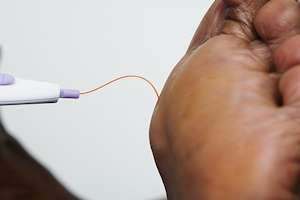Global study to help improve quality of life for patients with diabetes

Researchers at the Manchester Royal Infirmary's Diabetes Centre and Vascular Surgery Department together with microbiologists from The University of Manchester have recruited the first patient into a global study evaluating the best surgical practice to remove dead tissue from wounds that fail to heal effectively.
The results of the study may lead to changes in clinical care that significantly improve quality of life for patients with diabetes.
Around 2.9 million people in the UK are known to suffer from diabetes, and the condition can lead to a marked loss of feeling in the feet which, coupled with poor circulation, makes the development of foot ulcers relatively common. Ulcers can quite easily become infected and typically take a very long time to heal. In severe cases, the infection can spread to the surrounding bone and joints and become gangrenous, at which point it is necessary to amputate the limb.
To help prevent this circumstance from occurring, patients with diabetes who have infected foot ulcers must be treated quickly and effectively. Traditionally, this would be achieved by surgically removing dead or infected tissue using a scalpel blade, while leaving healthy tissue intact, thus reducing the spread of the infection.
However, this procedure can now be performed using a novel technology known as the WoundWand™ Debridement Device, which preclinical trials suggest may be more effective at reducing bacterial counts. It is hoped this could improve the pace of recovery, thereby helping patients with diabetes to recuperate more quickly. The new research study will evaluate the effectiveness of using a WoundWand compared with a scalpel blade to assess the difference in bacterial count, reduction in wound size and improved recovery time.
Chief investigators Drs Frank Bowling and Tawqeer Rashid believe the results of this study could considerably improve the quality of life of patients undergoing these types of procedures, particularly as the improper removal of dead tissue from infected wounds is a primary cause of recurring infection, which significantly increases the risk of amputation.
"We are very proud that our team has recruited the first global patient into this important clinical study. By ensuring that patients get the most effective treatment for ulcers, we can improve recovery time," Drs. Bowling & Rashid, based at the Manchester Diabetes Centre and Department of Vascular Surgery respectively, part of Central Manchester University Hospitals NHS Foundation Trust, said.
The WoundWand uses radiofrequency energy to gently and precisely dissolve soft tissue, thereby minimising damage to healthy tissue. The device is a type of Coblation technology, which is already used for wound care, for instance in Sports Medicine, but this will be the first time such techniques have been used to treat diabetic foot ulcers.
Patients taking part in the research, sponsored by creator of the WoundWand ArthroCare, will be treated using either a scalpel or the WoundWand device and will be followed up over 12 weeks to assess the healing of their wound.

















